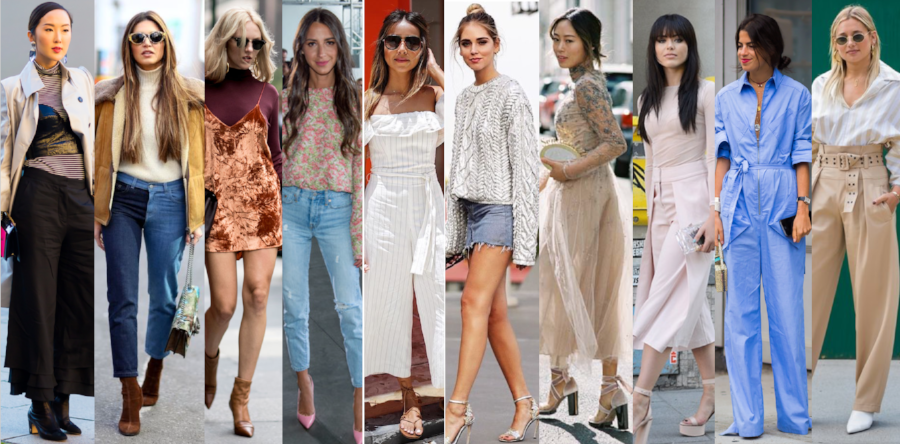 image: TFL
image: TFL
Who has the final say in cementing what is on-trend in fashion? For many years, that power lied firmly in the fashion industry’s esteemed print publications and the editors on their mastheads. As the Los Angeles Times noted, “Readers pored over pages to find out what [garments and accessories] they needed to buy and ads were aplenty.”
That held true for over a century, until the blogosphere and social media thrust a new type of tastemaker into the mix: Influencers. With the surge in uber-powerful Instagram fashion stars, such as Chiara Ferragni, Aimee Song, Chriselle Lim, and Arielle Charnas, who have the ability to impact consumers’ buying behavior, not only do traditional fashion magazines and age-old advertising techniques have a new peer (or competitor, depending on how you view it), the methods of advertising in the fashion industry have evolved significantly.
The marked downside of the rise of fashion industry influencers is the significant spike in federal truth in advertising law violations, particularly from the industry’s most followed influencers and brands. As we told you last year, fashion’s most successful personal style influencers and major fashion and cosmetics brands, alike, are at the root of a massive deceptive marketing scheme that has the effect of misleading consumers.
While it is required by law that social media posts that result from a relationship between a brand and influencer must be declared, it is a very common tactic for influencers to either disclose in a way that is not obvious or fail to disclose material connections altogether (often in an attempt to make the endorsement appear more authentic and therefore, more enticing for the viewer) – both of which amount to willful violations of the Federal Trade Commission (“FTC”) Act.
The following list – our second annual review of influencer disclosure practices – takes into account 25 of the industry’s most celebrated influencers – from the biggest names, such as Chiara Ferragni and Julie Sarinana, to some slightly lesser-followed but still very noteworthy ones, like Nicolette Mason, Marianna Hewitt, and Natalie Suarez, as well as the brands with which they are associated.
Far from merely providing a look at the influencers that are and are not abiding by federal advertising laws, this review – as derived from the data we compiled by reviewing over 41,000 Instagram posts (and in some cases, related Twitter and Facebook posts) by over 50 different influencers (we ultimately highlighted 25 of them) and upwards of 300 featured brands – should serve an educational reference for how influencers and brands, alike, can improve their disclosure practices and thereby, avoid investigation by the FTC.
The Terms of the Rankings
The following rankings are predicated most centrally upon the number of Instagram posts each individual has published over the six-month period at issue (July 1 to December 31, 2017) and how many of those posts were the result of a material connection between the posting party and an advertiser but were not disclosed as such. This percentage ranking method was also utilized for the brands listed.
The rankings focus on the presence of outright sponsorships that have not been disclosed verses those that have; this takes the form of paid-for (or otherwise compensated) posts, such as personal style-type advertisements and posts born from the rampant sponsorship of events and getaways by brands/retailers, such as American Express and Revolve.
In order to give you the most accurate and complete view of the landscape of influencers’ activities in connection with the existing truth in advertising laws, we – with the input from an array of lawyers working within the advertising and social media sphere – have construed the FTC’s Guidelines rather strictly.
The following elements are were taken into account in furtherance of the rankings …
DISCLOSURES: The FTC has long held that disclosures are required when the posting party (such as a blogger/influencer) has been compensated (with money, free garments and accessories, free travel accommodations, and other perks) to post about and/or endorse a specific product or service, and that would otherwise not be obvious.
While the FTC has held that there is no set language that posting parties must use, its guidelines and directors have set forth additional lifelines in terms of what will and will not be deemed effective. “#Ad,” “Sponsored” and “Promoted” will undeniably suffice. Given the FTC’s stance that posts accompanied by “ambiguous” hashtags, such as “Ambassador,” “Collab,” and “Influencer,” are not likely to be deemed as clear or conspicuous, they have been categorized as invalid disclosures for the purpose of this ranking.
As for “partner,” this disclosure may be in line with the FTC’s guidelines as long as it comes in the following form: “Hashtag XXPartner when XX is brand name.” The same is likely true for “ambassador,” which on its own is “an ambiguous disclosure,” according to the FTC.
Mary K. Engle, the associate director for the FTC’s Ad Practices Division, provided further guidance: “Simply saying ‘thank you’ to a brand or adding ‘#sp’ or ‘#spon’ probably isn’t clear enough.” As such, these are invalid in accordance with this ranking.
PLACEMENT: According to the FTC, “If [a disclosure hashtag] is mixed in with links, handles or other hashtags, readers may naturally just skip over all that clutter. With multiple links & hashtags, #ad may go unnoticed, [it is] best to make it visible in the beginning.” Additionally, including “ad,” “sponsored” or other disclosure-type language after the “More” button on Instagram – thereby, requiring followers to scroll down (on mobile and desktop) to learn of the disclosure – has been deemed to be almost certainly invalid by the FTC.
CLARITY: While an influencer’s connection with a certain brand (by way of an ambassadorship, advisor, consultant, or ownership role) may be obvious to some – or even many – only a “significant minority” of consumers must be misled as to whether the parties have a connection and what the extent of that connection is for a disclosure to be deemed misleading and invalid in accordance with the FTC guidelines.
The FTC has explicitly stated that it is “not common knowledge” that influencers/bloggers are paid to post.
“PAID PARTNERSHIP” FEATURE: Posts that make exclusive use of Instagram’s “Paid Partnership” disclosure feature have been considered invalid for the purpose of this ranking. According to the FTC, “Don’t assume that disclosures built into platforms are sufficient … FTC staff doesn’t think that the built-in YouTube and FB tools suffice. The same applies to the built-in Instagram tool.”
With this in mind, it is likely best to include clear and concise disclosure language, such as “#Ad,” #Sponsored,” or #[Brand Name]Partner, as well.
REPEATED DISCLOSURES/OTHER AFFILIATIONS: A single disclosure alerting followers to an influencer’s relationship/affiliation with a brand is not sufficient for additional posts that arise from that same relationship. According to the FTC, “Disclosures should be repeated,” particularly if there is a chance that the previous disclosure has not been read. Moreover, even if a post was not specifically paid for, the FTC has held that influencers “should still disclose [their] connection to the brand.”
GIFTS: While in the 2016 annual ranking, “gifts” – products gifted to the influencers largely for the purpose of placement on their highly-watched social media channels – were not accounted for, they were factored into the rankings this year when they were obviously not disclosed.
PRODUCT TAGS: Not taken into account in calculating the following rankings were undisclosed product/brand tags on the photos themselves. Sans any disclosures regarding tags, it is simply too difficult to determine which tags are – and are not – the result of material connections.
JURISDICTION: It is worth noting that while the FTC is a U.S.-specific law, it applies to all entities operating in commerce in the U.S. Moreover, similar laws exist in other nations. In the U.K., for instance, the Advertising Standards Authority is beginning to clamp down on ethically questionable and oftentimes misleading advertising practices. This is why non-American-based influencers are, in fact, included.
INFLUENCERS’ BRANDS: Many of the individuals on the ranking maintains brands of their own, which, in many cases bear names different than there own, such as Second Skin Overalls for Danielle Bernstein or A Bikini A Day for Natasha Oakley. Given the FTC’s stance on the clarity and need for repetition of disclosures, some individuals ranked poorly as a result of their failure to consistently make clear their relationship to such brands.
The Rankings: July 1 to December 31, 2017
I. BLOGGERS/INFLUENCERS
A. EXEMPLARY
These influencers boasted the highest percentage of properly disclosed posts (relative to the number of total posts within the time period), and very few undisclosed sponsored/affiliated posts. Moreover, additional points – such as the declaration of gifts or affiliate links, and/or the clear specification of their connections to their own companies (if it would otherwise be unclear) – were taken into account.
* NOTE: Within the main hierarchies (Exemplary, Above Average, Average, Below Average, and Least Commendable), individuals are listed in alphabetical order and not ranked further.
1. Arielle Charnas, Something Navy (1.1M followers) – Arielle Charnas moved up from an “Above Average” ranking (her placement on last year’s ranking), due to a notable increase in properly disclosed sponsored posts.
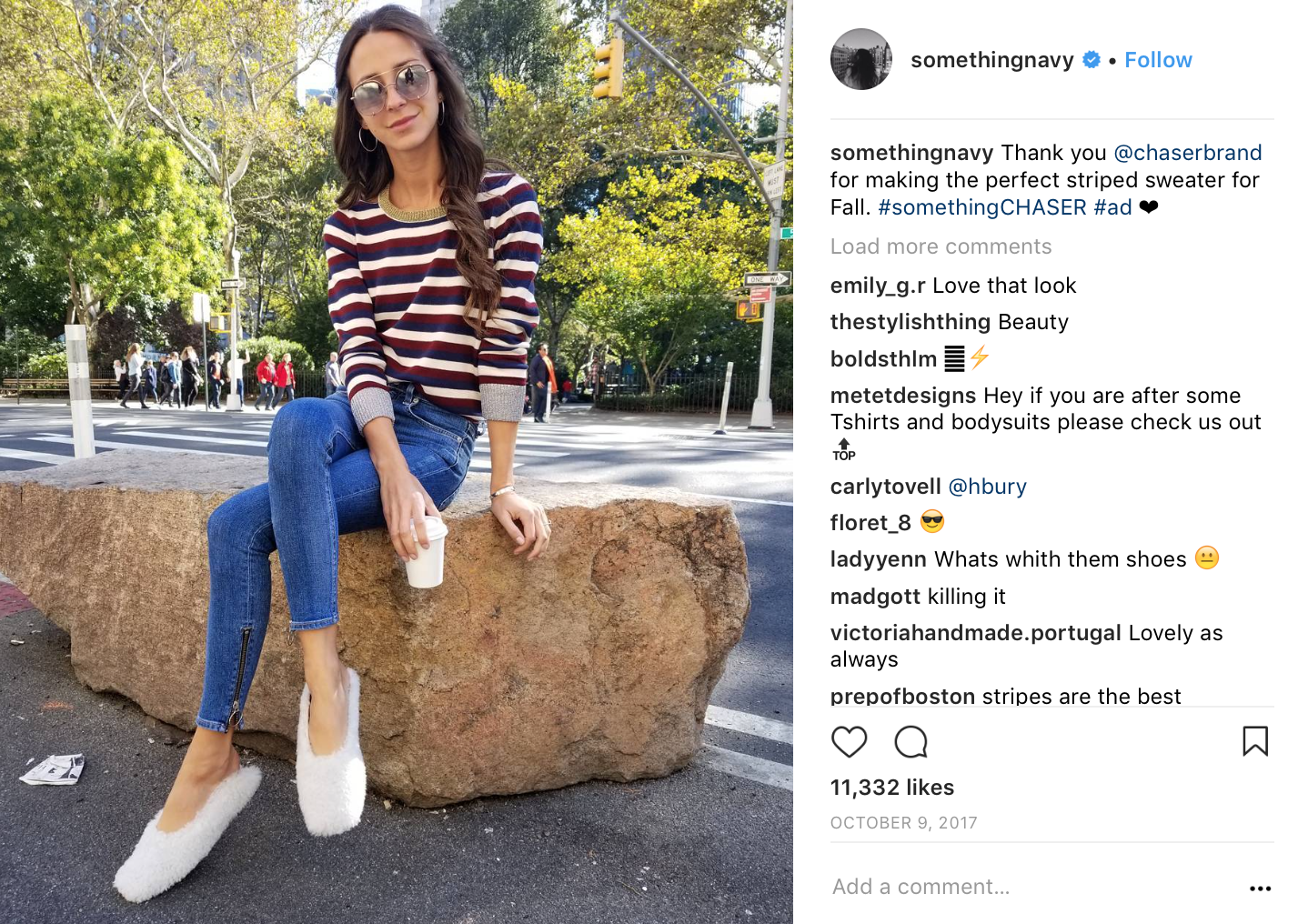 image: @somethingnavy
image: @somethingnavy
2. BryanBoy (663K) – Bryan returned to the “Exemplary” category after ranking in the uppermost category last year. In addition to properly disclosing the vast majority of his posts, Bryan ranks particularly well due to his inclusion of language indicating products that are gifts from brands, a relative rarity amongst the influencers at play.
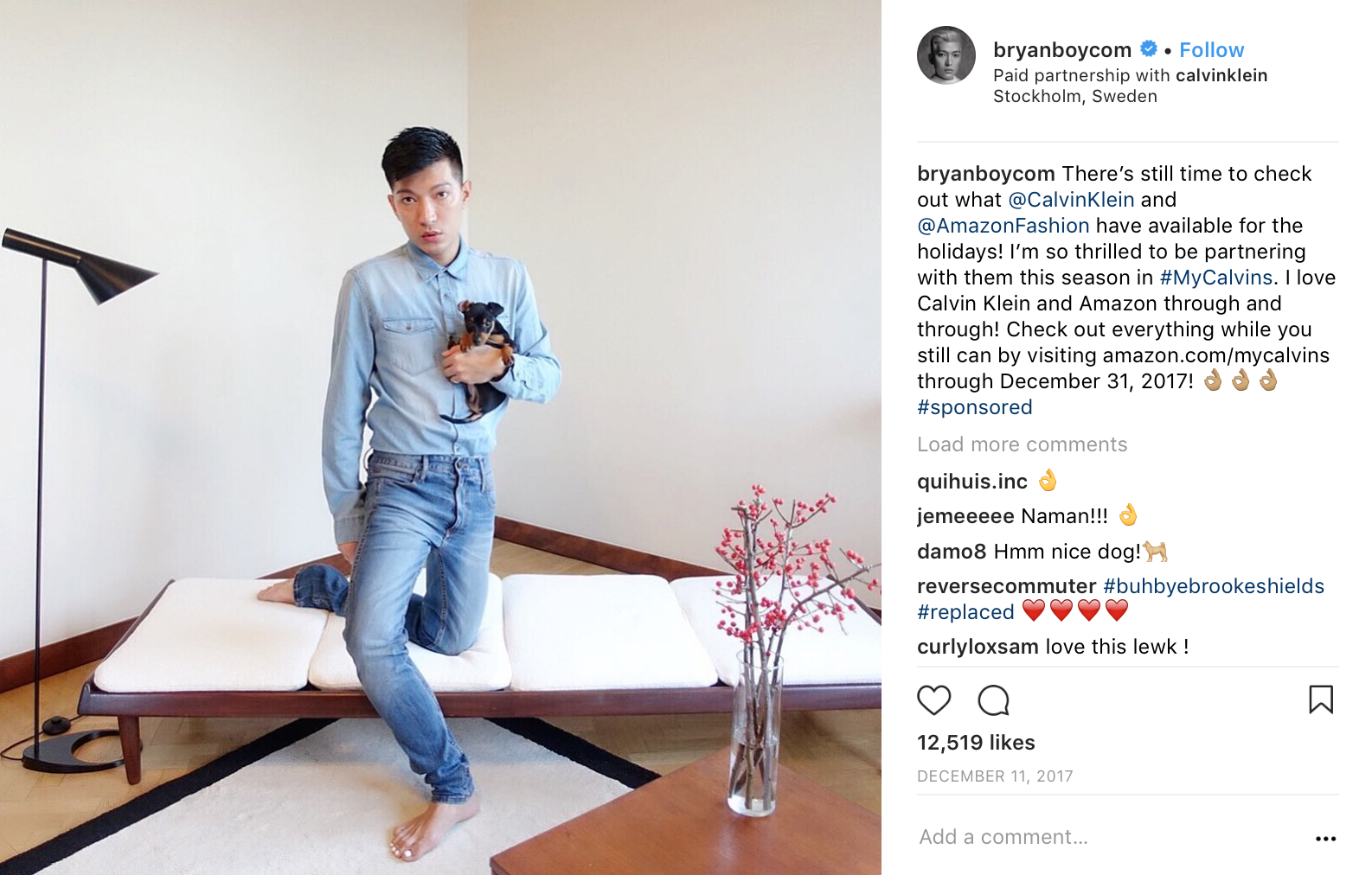 image: @bryanboy
image: @bryanboy
3. Caro Daur (1.3M) – New: In addition to routinely disclosing traditional sponsored posts, Daur’s disclosures stand out due to her disclosure of gifts, as well as of events that she covers that result from a material connection/relationship with the host brand.
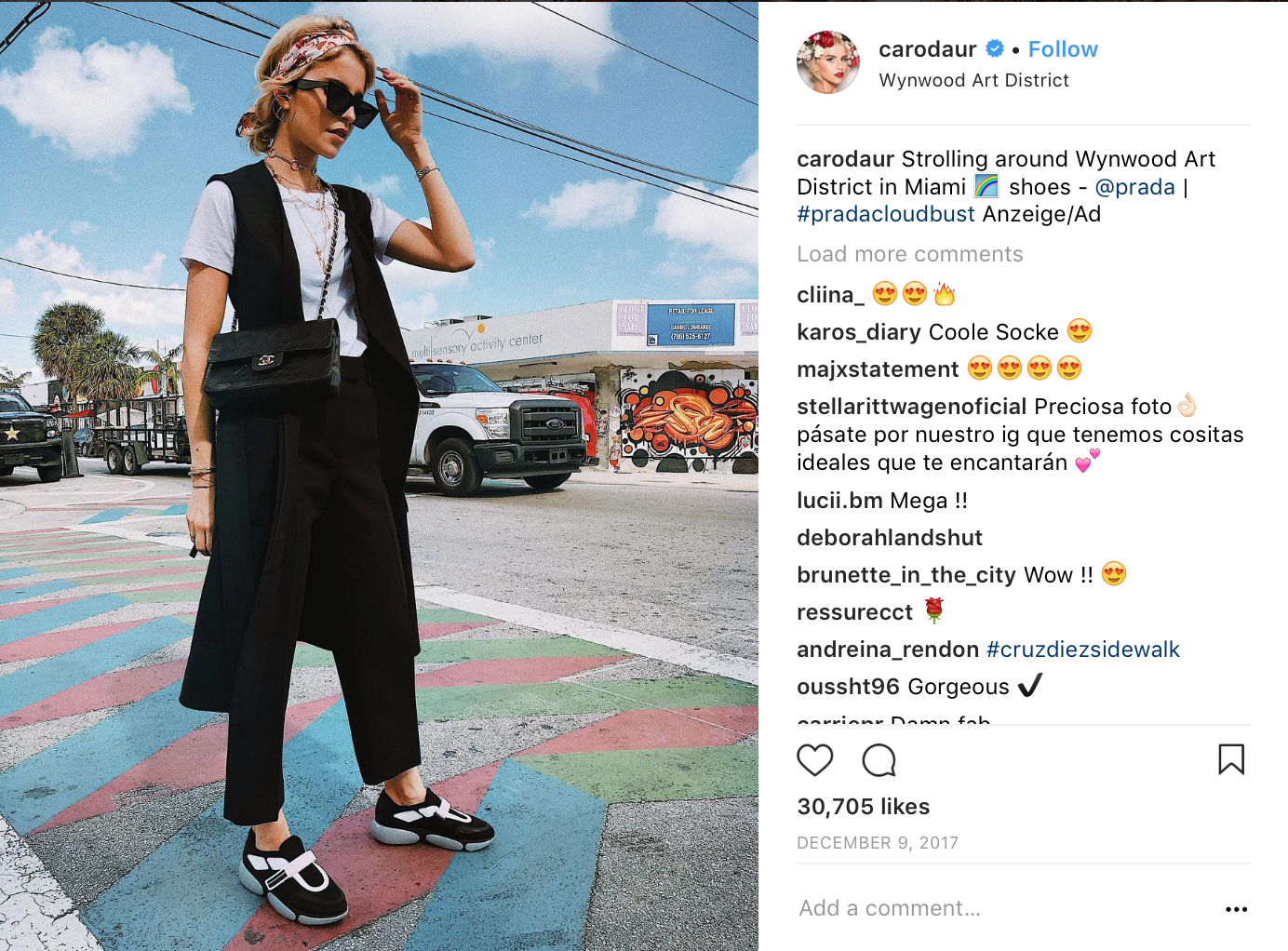 image: @carodaur
image: @carodaur
4. Gabi Gregg (573K) – New: Gabi lands in the uppermost ranking due to her routine proper disclosure of sponsored materials, including the utilization of both the Instagram “Paid Partnership” along with explicit disclosure language within the caption section of her post.
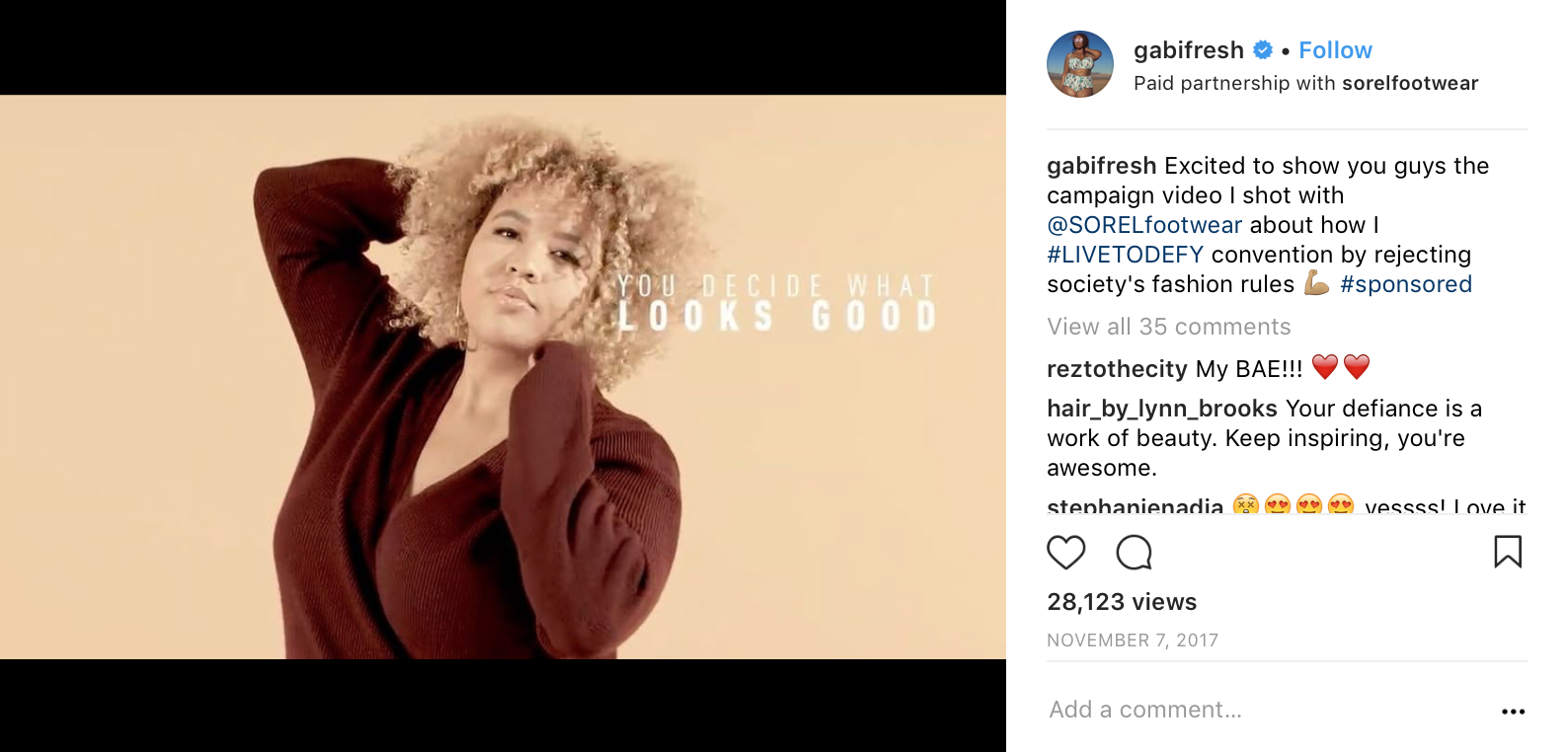 image: @gabifresh
image: @gabifresh
B. ABOVE AVERAGE
These individuals/accounts occupy an above-median space. This means that the rate of properly disclosed sponsored posts was greater than or was closely mirrored the number of undisclosed or improperly disclosed posts, but they lagged behind the most abiding figures in the former category.
1. Aimee Song, Song of Style (4.7M) – Super-influencer Aimee Song is one of the most improved in terms of her disclosures compared to last year’s list. After ranking as “Average” last year – due to “no small number of sponsored posts, including ones tied to Laura Mercier, a brand with which Song has a material relationship, are posted without proper disclosures – Song has made significant steps to improve her disclosure practices.
How Aimee could improve further: Provide users with clear and conspicuous disclosures in connection with posts that arise from a material connection with e-commerce retailer Revolve.
 image: @songofstyle
image: @songofstyle
2. Chiara Ferragni, The Blonde Salad (11.5M) – The most improved of all of the individuals on this list is Chiara Ferragni. Last year, Ferragni ranked as the least commendable influencer, landing in “the spot of the individual who most frequently fails to abide by the FTC’s guidelines. Of the 100+ sponsored posts that Los Angeles-based Ferragni posted in the three-month period at issue, just 2 were properly disclosed putting her percentage of properly disclosed posts at lower than 2 percent.”
However, since her business partner received a letter from the FTC regarding its guidelines, Ferragni has significantly increased the frequency with which she clearly identifies sponsored posts. As for where Ferragni could improve further: She could make it clear which garments and accessories that appear in her Instagram posts are gifts from brands, and avoiding placing multiple hashtags together when using a disclosure hashtag.
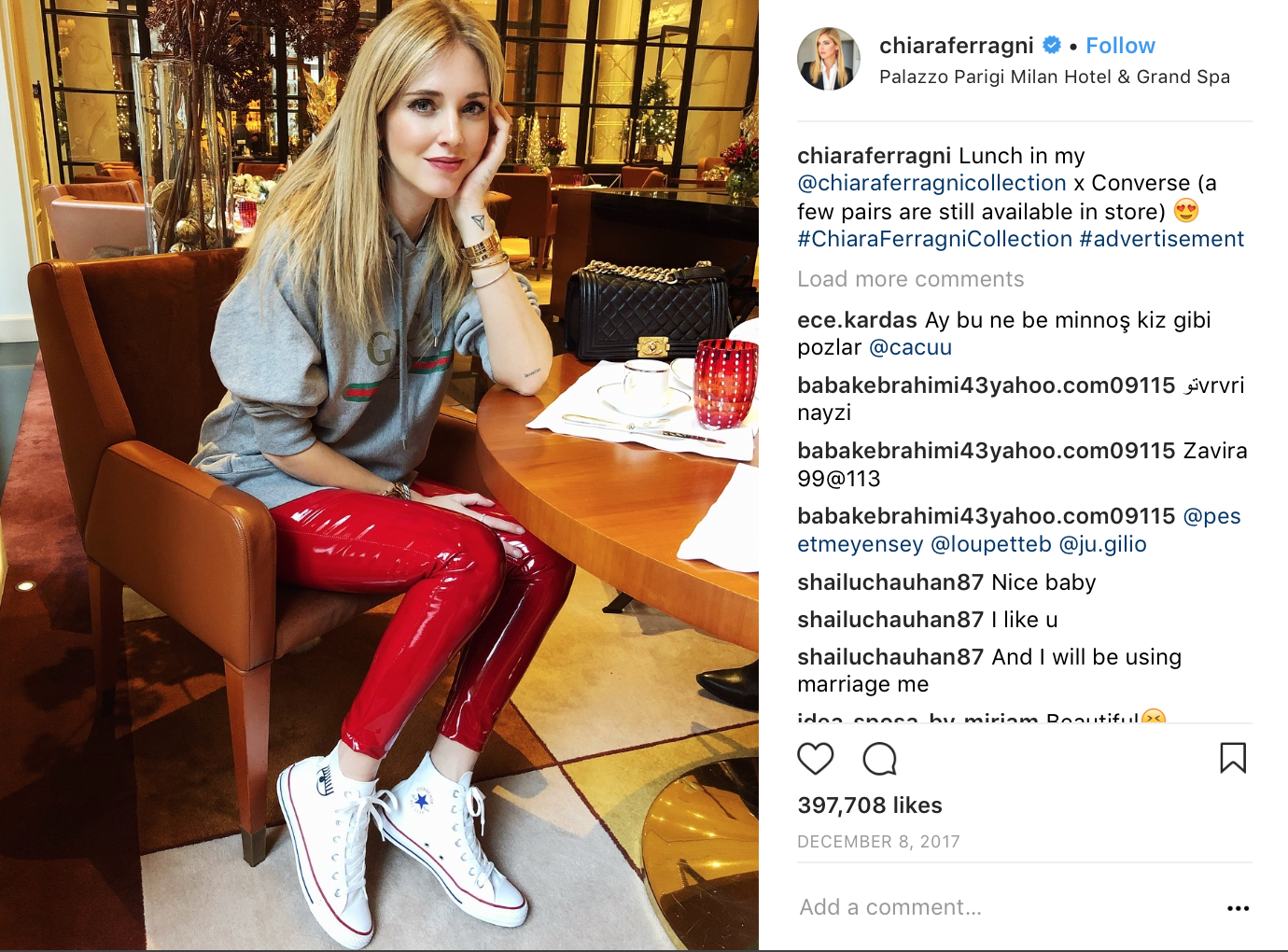 image: @chiaraferragni
image: @chiaraferragni
3. Jenn Im (1.6M) – New: Jenn Im ranked as “Above Average,” as opposed to “Exemplary” due to the lack of disclosures surrounding her brand, Eggie Shop, as well as in connection with Revolve.
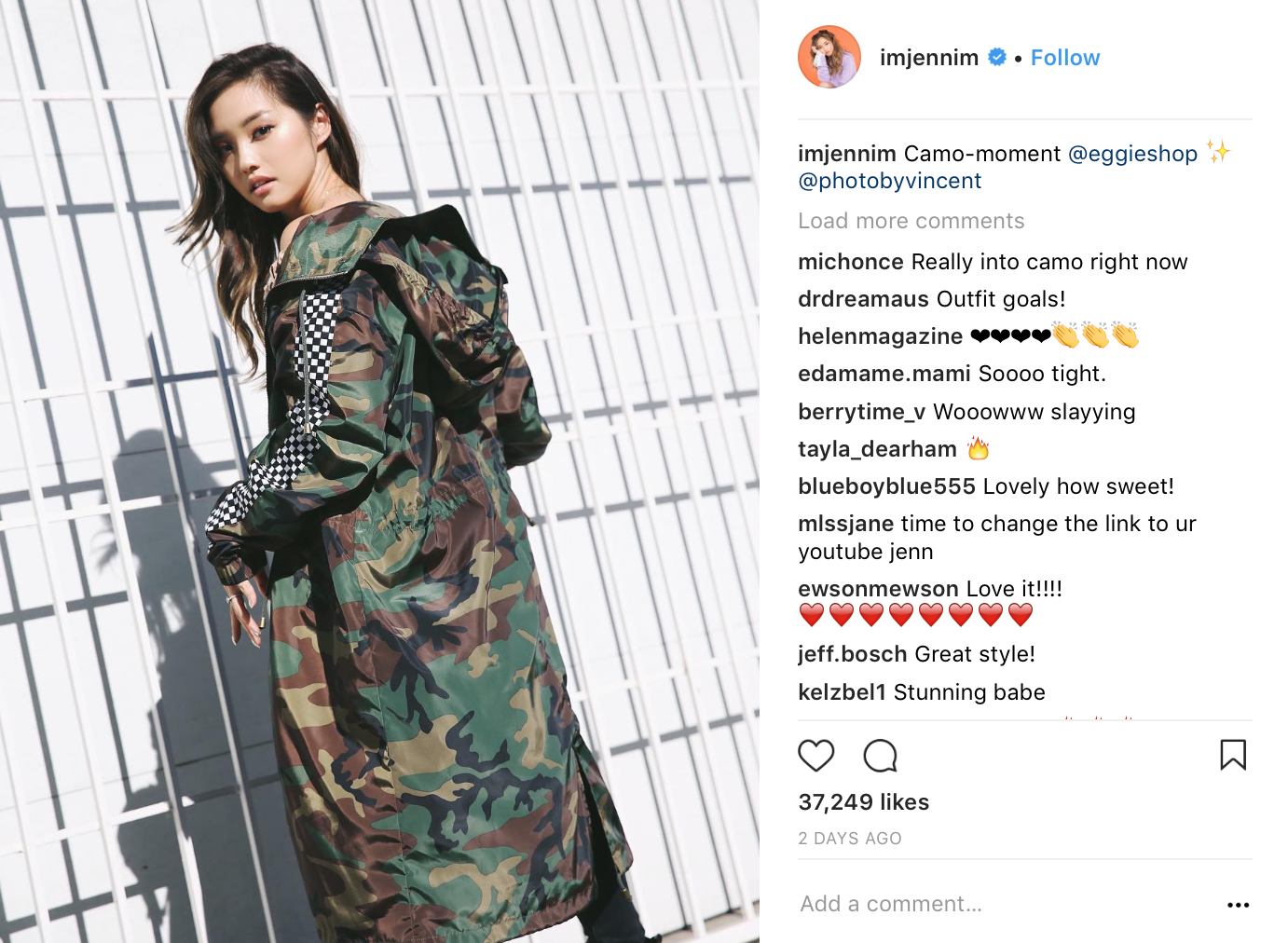 image: @imjennim
image: @imjennim
4. Marianna Hewitt (779K) – Marianna returns to an “Above Average” placement after ranking the same way last year due to her widespread proper disclosure practices. She could benefit from extra attention to disclosures that only made use of Instagram’s “Paid Partnership” feature and those that include language below Instagram’s “More” button.
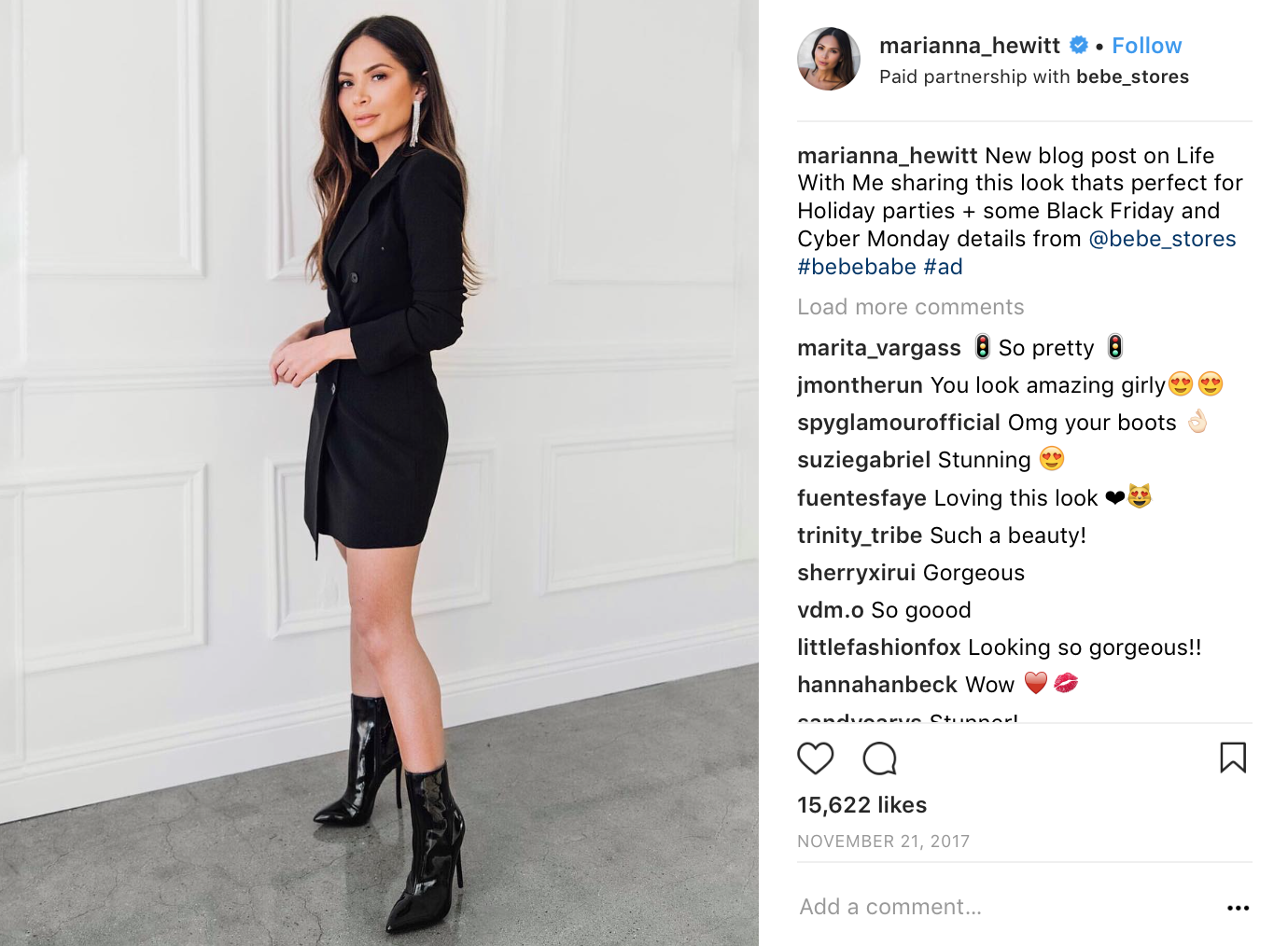 image: @marianna_hewitt
image: @marianna_hewitt
5. Nicolette Mason (160K) – New: Nicolette landed in an “Above Average” because she disclosed nearly all of her sponsored posts but could benefit from moving the disclosure language above the “More” button in some instances and not exclusively relying on the Instagram “Paid Partnership” tag.
She ranked well in large part due to her clear disclosure of her connection to her brand, Premme. She is an interesting example, as while most of her posts that feature garments from her own line do not use hashtag disclosure, they make clear via plain language – i.e., “our new collection” – that she has a material connection with the brand (which is permissible according to the FTC; hashtags are not the only way to indicate a material connection).
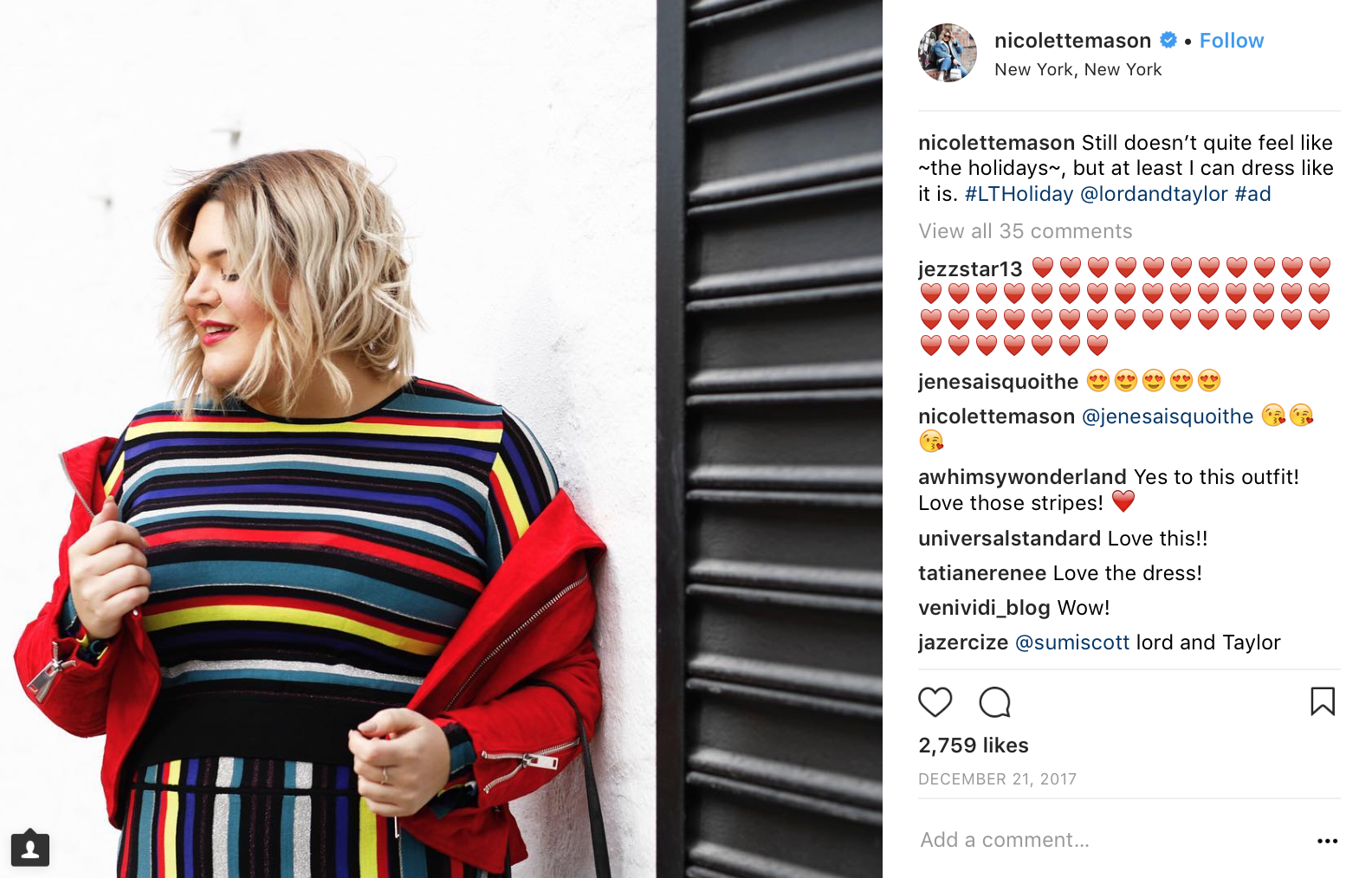 image: @nicolettemason
image: @nicolettemason
C. AVERAGE
These individuals/accounts occupy an average space, meaning that while they disclosed the majority of their posts, they did so in a way that the FTC has held it would most likely deem improper (i.e., by only using Instagram’s “Paid Partnership” feature or including disclosure language after the “More” button, etc.).
1. Amber Fillerup Clark, Barefoot Blond (1.3M followers) – New: Amber discloses the majority of her posts in a proper manner. She ranked as “Average,” as opposed to “Above Average” due to the lack of disclosures surrounding her own brand, Barefoot Blonde Hair, and her inclusion of disclosure language below Instagram’s “More” button.
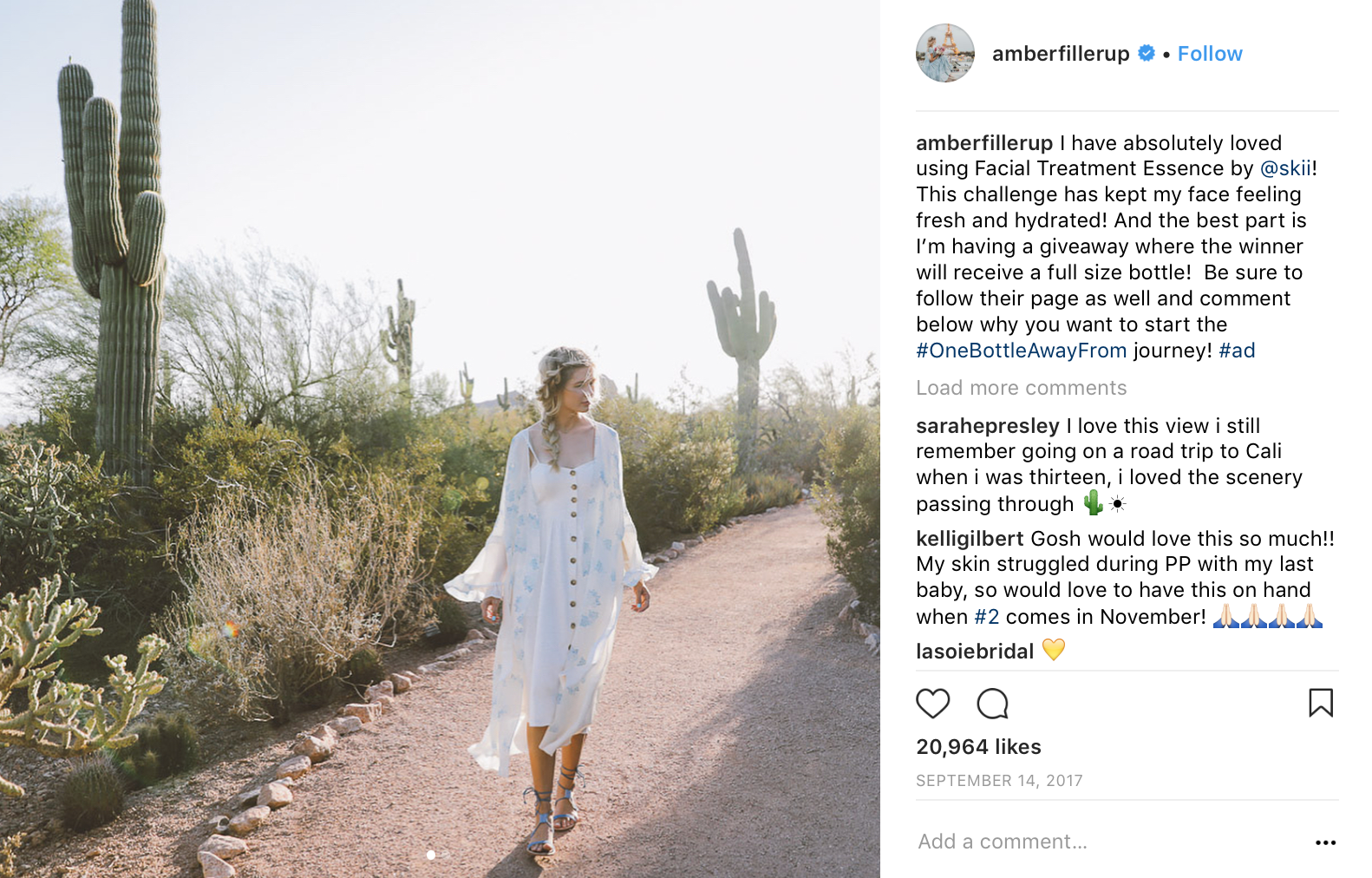 image: @amberfillerup
image: @amberfillerup
2. Danielle Bernstein, WeWoreWhat (1.7M) – Danielle Bernstein lands in an “Average” position. While she did disclose a notable number of posts for other companies, such as Target, Fiji, H&M, and Nordstrom, she could better distinguish and disclose her connection with her own brands, including Second Skin Overalls, Archive Shoes, and Body Bauble, which could prove unclear for users sans individual disclosures.
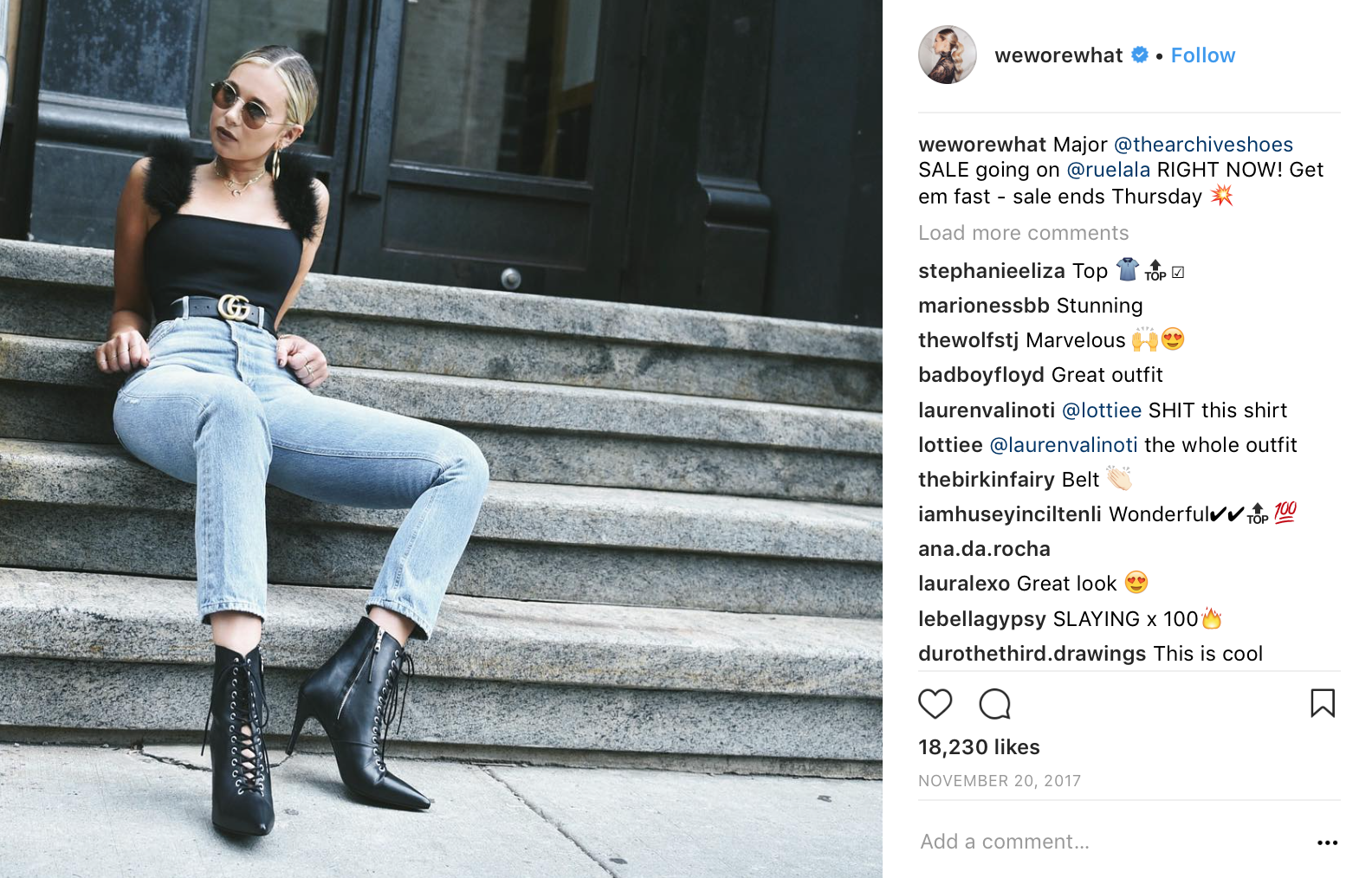 image: @weworewhat
image: @weworewhat
3. Julia Engel, Gal Meets Glam (1.1M) – Julia rose from a “Below Average” ranking (her placement on last year’s ranking) to an “Average” position this year due to a rise in consistent disclosures, particularly in comparison to last year. While she disclosed more sponsored posts than last year, many of those disclosures are done so in ways that the FTC has deemed improper, including hidden amongst other hashtags and below Instagram’s “More” button.
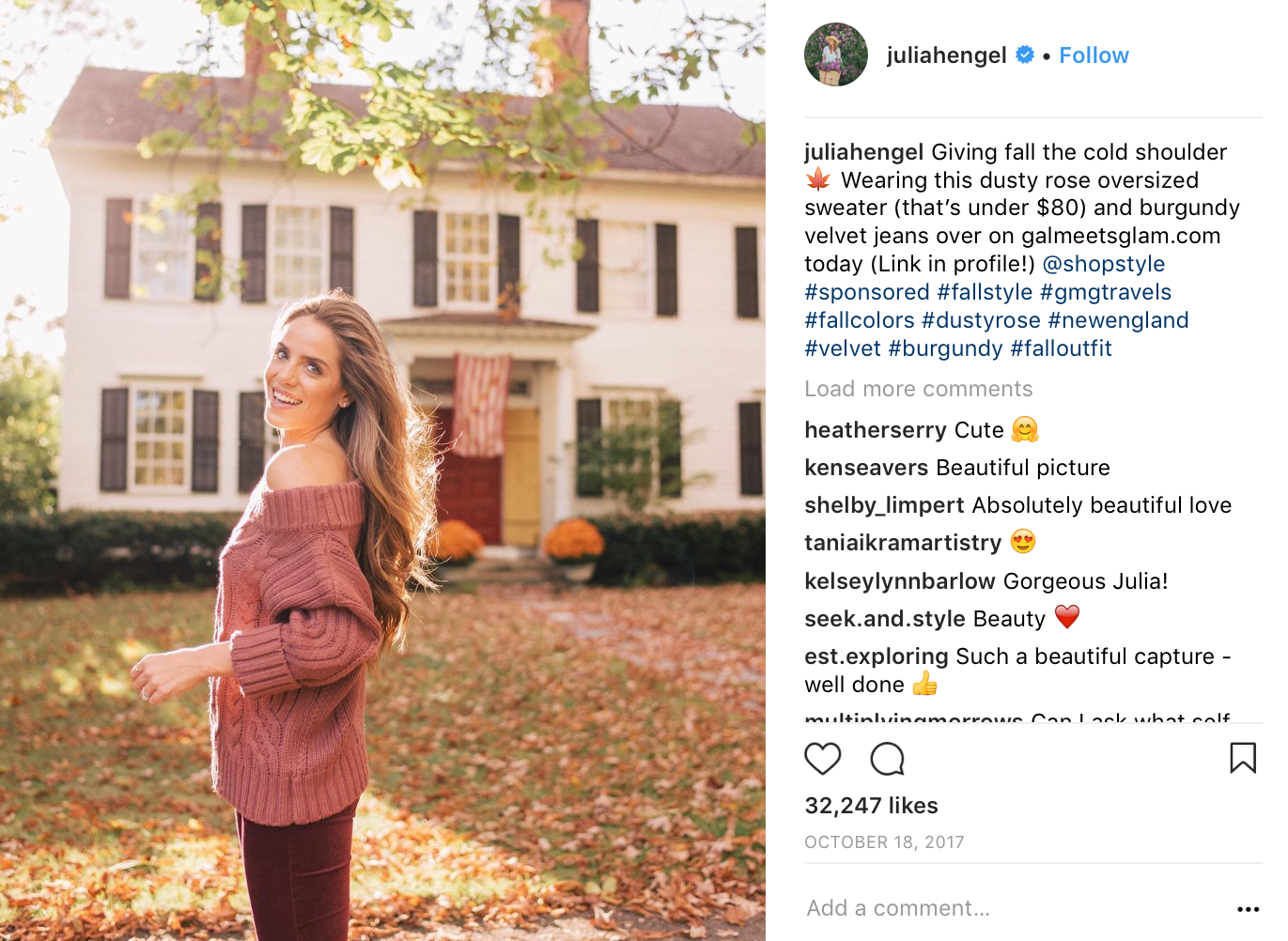 image: @juliahengel
image: @juliahengel
4. Man Repeller (1.9M) – Man Repellerr has risen from “Below Average” (her placement on last year’s ranking) to an “Average” position this year due to a rise in consistent disclosures. This account could greatly benefit from adding disclosure language to the text of the caption, as the FTC has held that exclusively using Instagram’s “Paid Partnership” feature – which is how Man Repeller discloses the vast majority of its sponsored posts – likely does not amount to a valid disclosure.
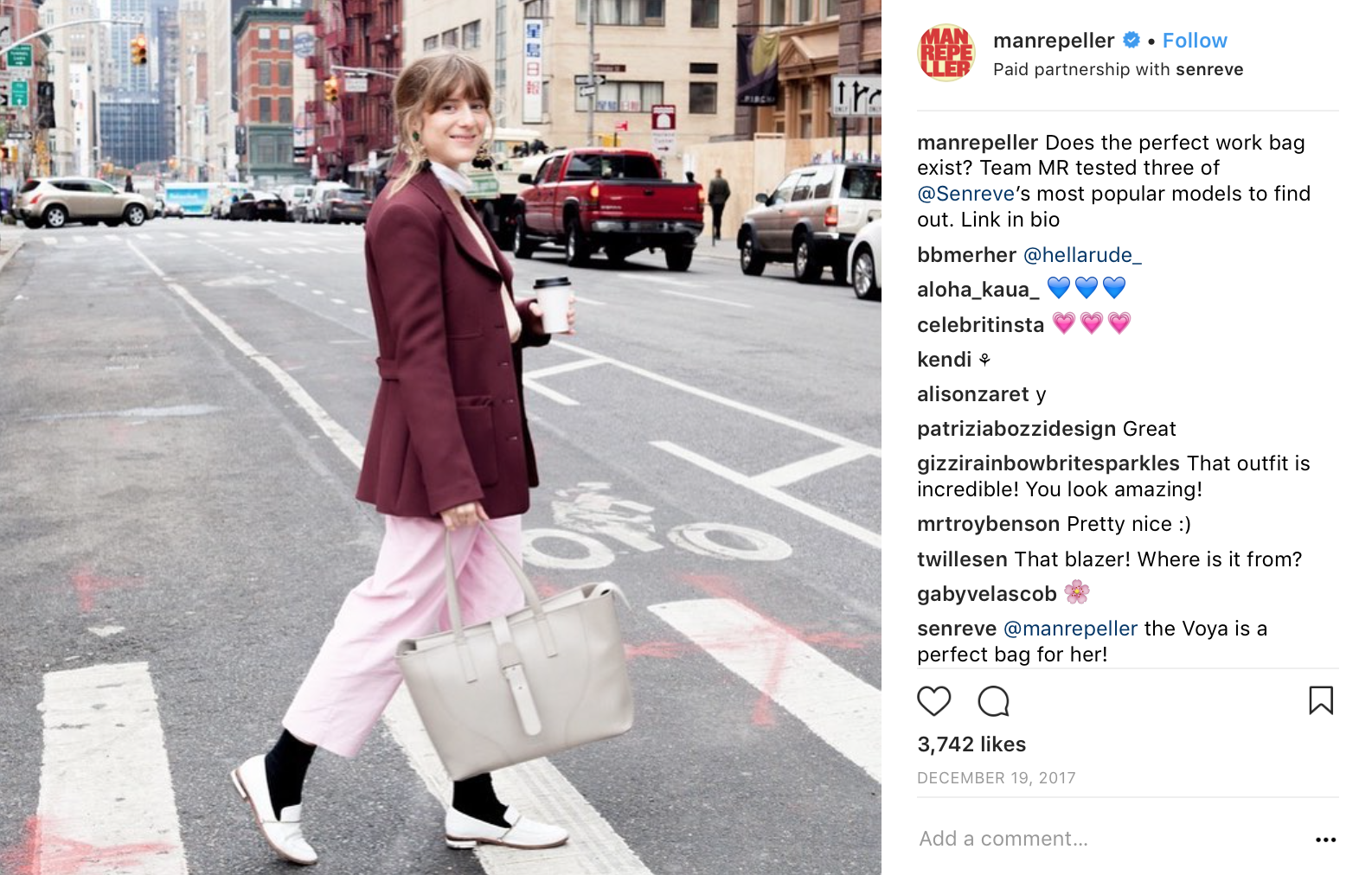 image: @manrepeller
image: @manrepeller
5. Natasha Oakley (1.9M) – New: While Natasha does, in fact, disclose a significant portion of her posts properly, she ranks as “Average” due to the fact that she does not disclose her affiliation with her own brands and at times, it can be unclear. She notes in her bio line that she is the co-creator of @ABikiniADay and the creative director of @MondaySwimwear. However, as noted by the FTC, it is not necessarily true that viewers will see this when looking at their timelines, thereby potentially making the relationship between Oakley and her brands unclear.
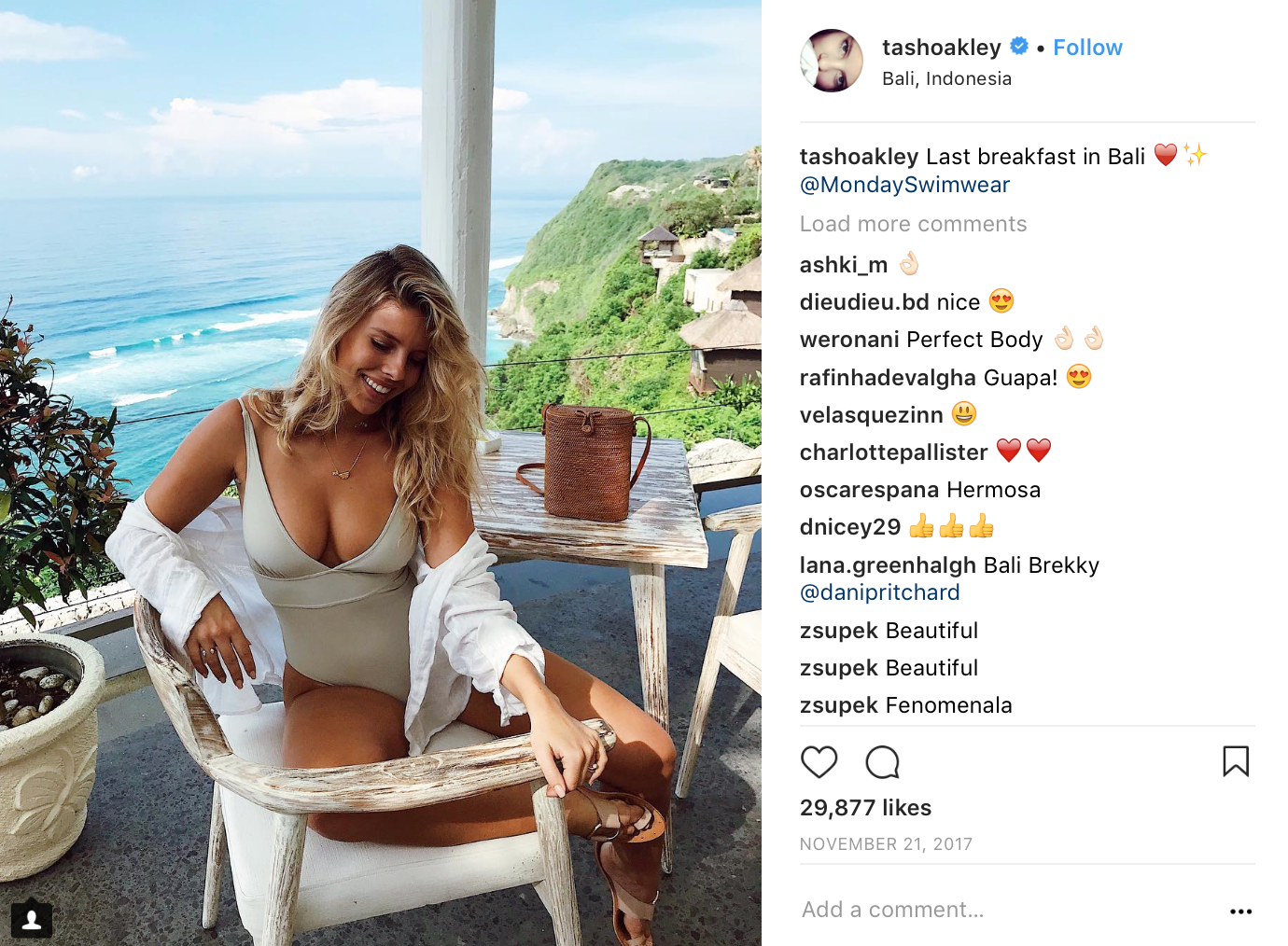 image: @tashoakley
image: @tashoakley
6. Rocky Barnes (1.1M) – Rocky remained in an “Average” position, the same as she held on last year’s ranking. While many (although not all) of her posts are disclosed, the language is often either hidden among other hashtags or located below the “More” button. Also, she could benefit from disclosing her connections with Revolve, in particular.
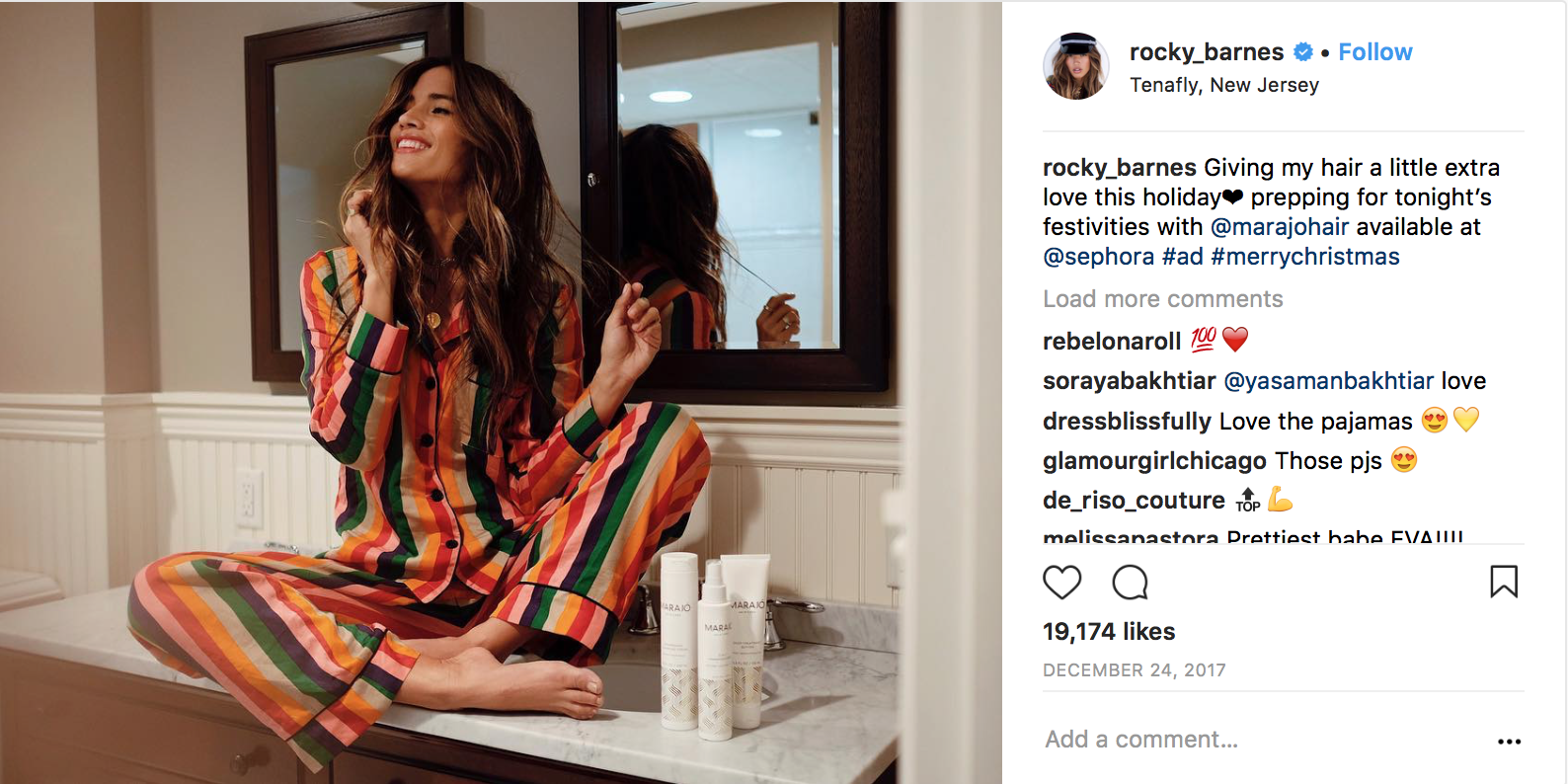 image: @rocky_barnes
image: @rocky_barnes
7. Shea Marie, Peace Love Shea (1.1M) – Shea Marie drops from an “Above Average” placement (her placement on last year’s ranking) to “Average.” She could benefit primarily from clearer disclosure, at times, in regards to her own brand, Same Swim.
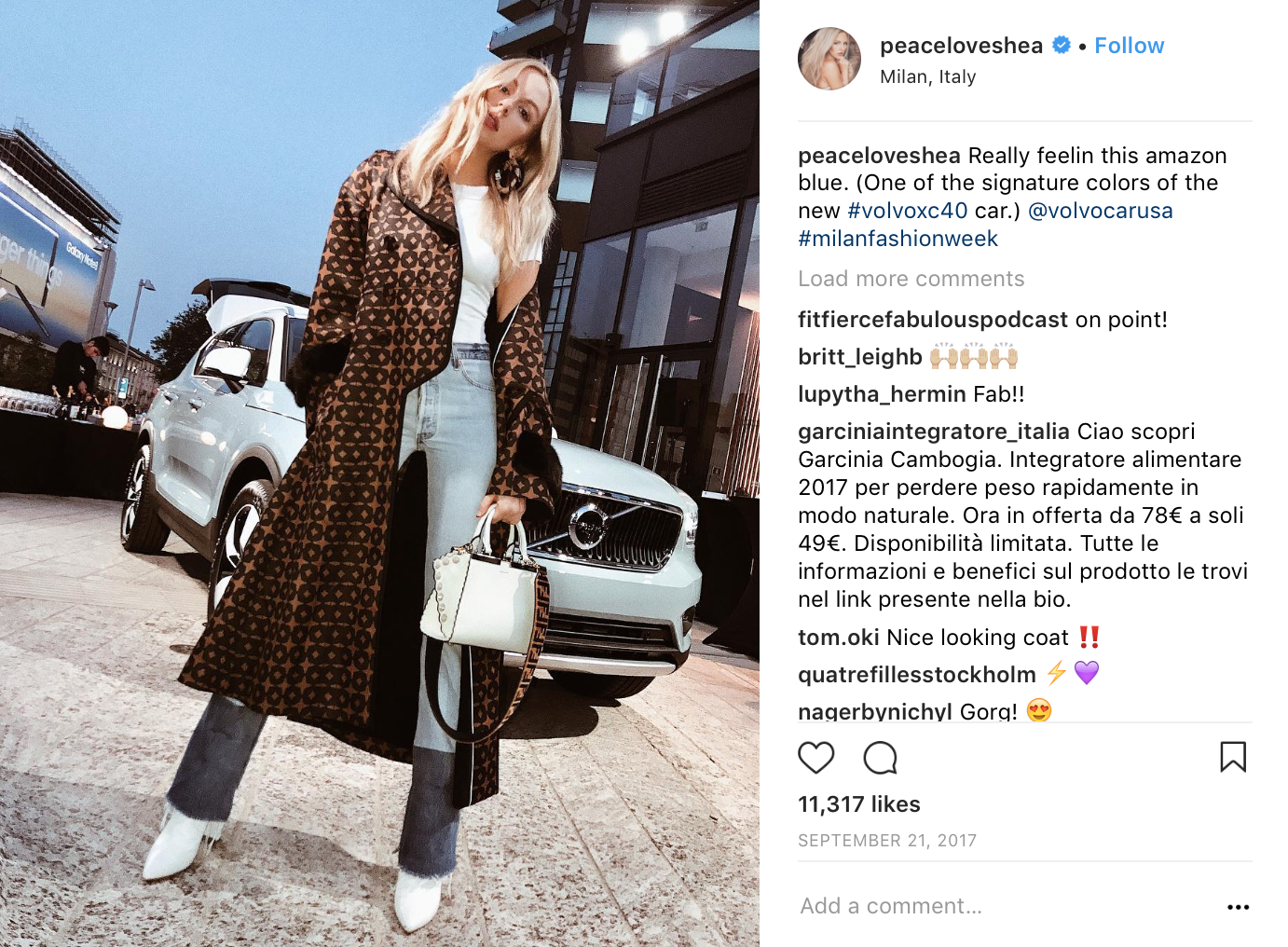 image: @peaceloveshea
image: @peaceloveshea
8. Wendy Nguyen (1.1M) – Wendy dropped from an “Above Average” (her placement on last year’s ranking) to an “Average” position this year due to a rise in improperly disclosed posts, namely the use of Instagram’s “Paid Partnership” feature sans any other valid disclosure language.
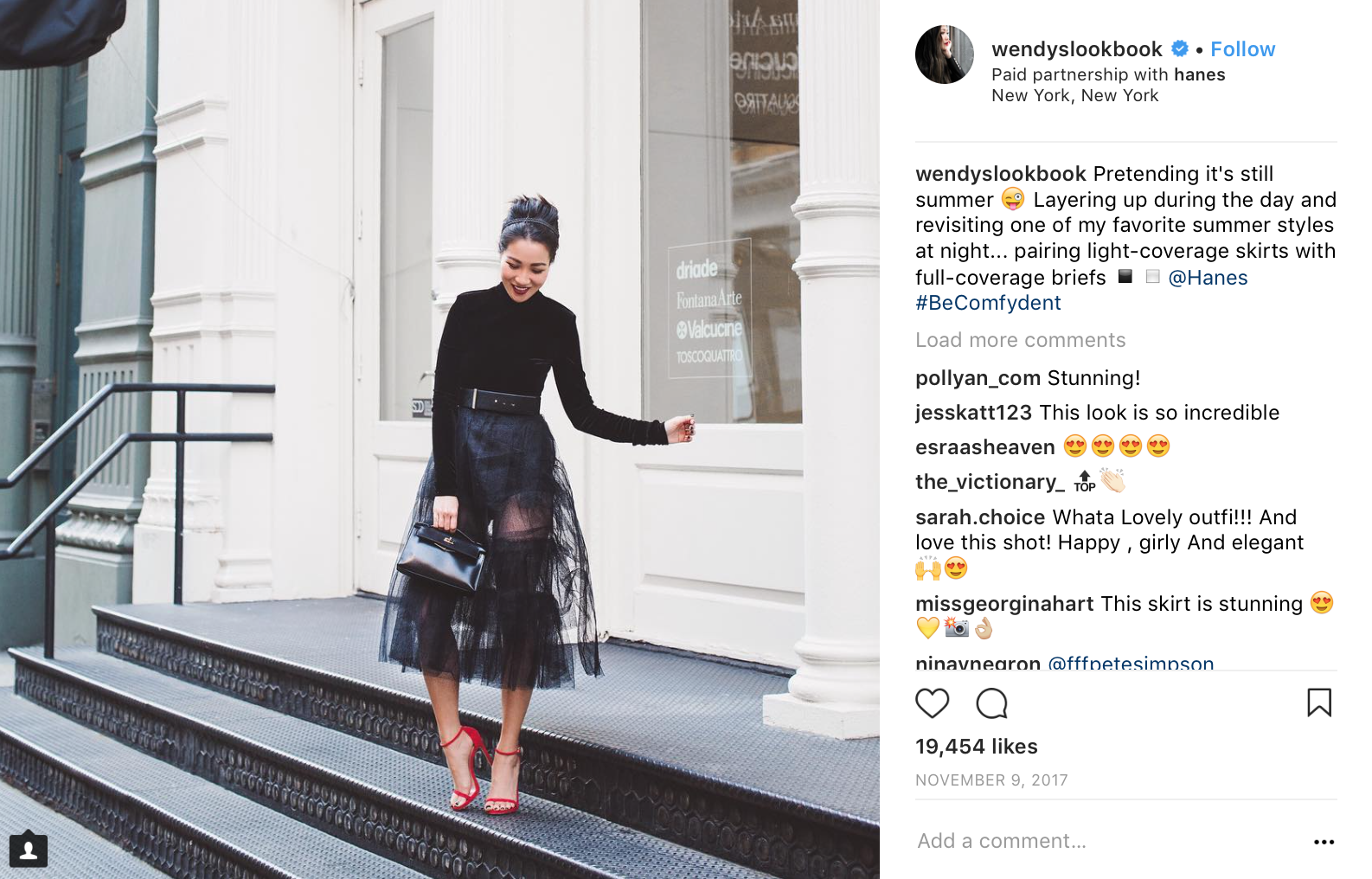 image: @wendyslookbook
image: @wendyslookbook
D. BELOW AVERAGE
These individuals are categorized as below average, meaning that the rate of undisclosed and/or improperly disclosed posts outweighs those that were disclosed and disclosed in a proper manner in accordance with the FTC’s guidelines.
1. Chriselle Lim (1M) – Following last year’s ranking, in which she nabbed an “Above Average” ranking, Chriselle Lim fell to a “Below Average” position due to a rise in undisclosed/improperly disclosed posts for brands ranging from her own label Cinc to Revolve, Omega, Armani, and Michael Kors, among others.
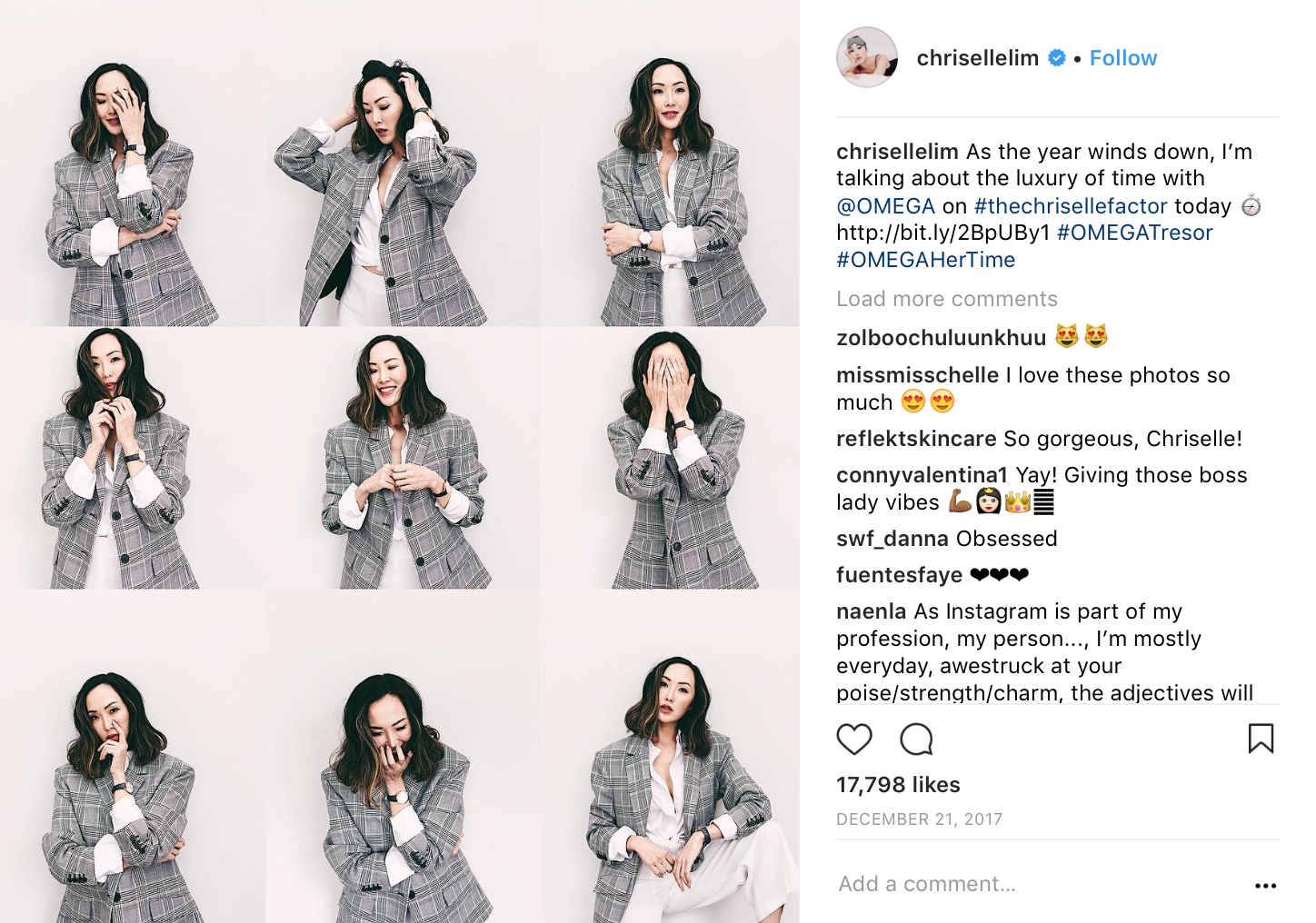 image: @chrisellelim
image: @chrisellelim
2. Natalie Suarez, Natalie Off Duty (504K) – New: While Natalie Suarez was not included in last year’s main ranking, she was included in the list of noted individuals that were largely failing to abide by the FTC’s guidelines. In the period of examination for 2017, her account exhibited a significant percentage of undisclosed and/or improperly disclosed posts.
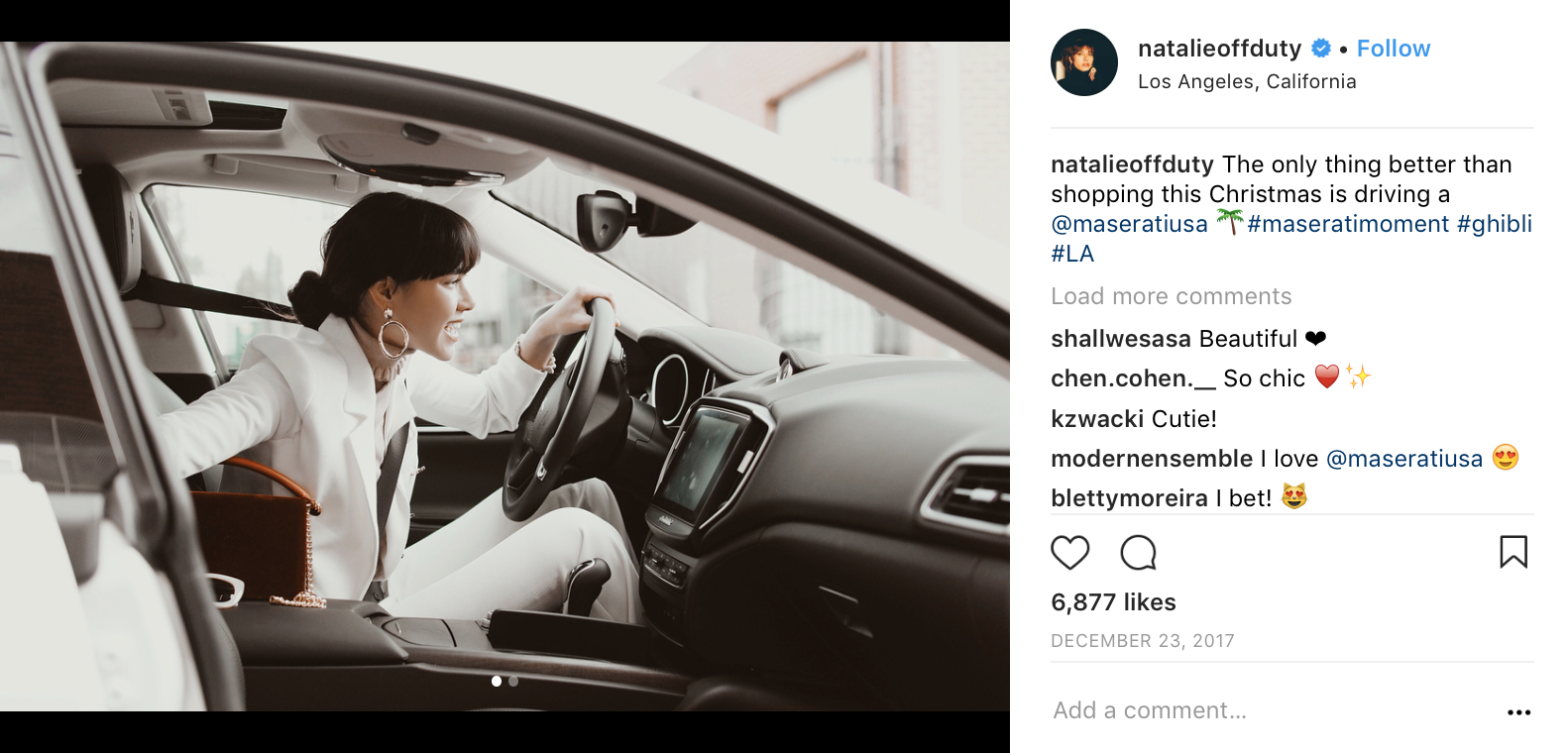 image: @natalieoffduty
image: @natalieoffduty
3. Negin Mirsalehi (4.5M) – New: While Negin Mirsalehi was not included in last year’s main ranking, she was included in the list of noted individuals that were largely failing to abide by the FTC’s guidelines. In the period of examination for 2017, her account exhibited a significant percentage of undisclosed and/or improperly disclosed posts.
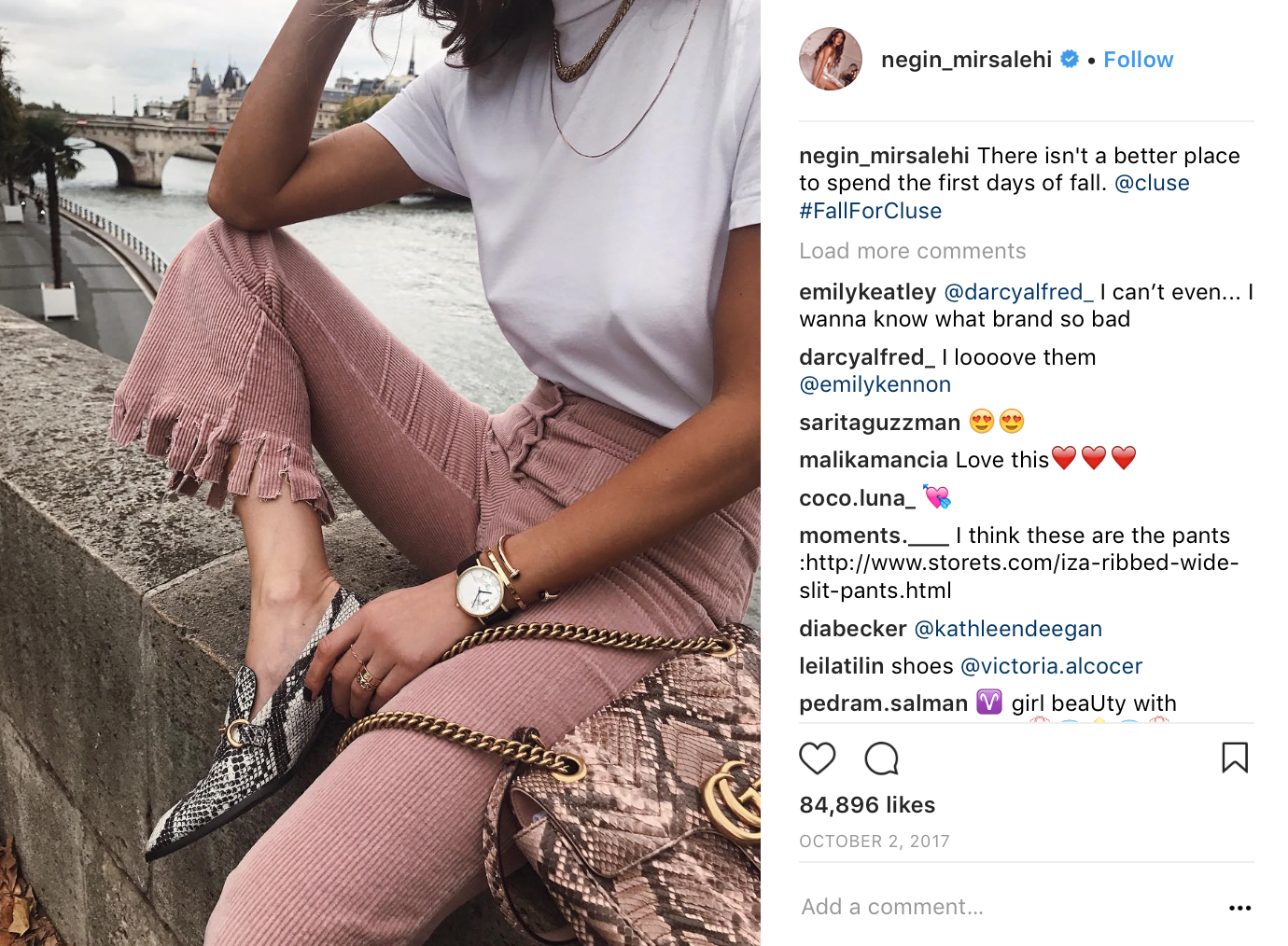 image: @negin_mirsalehi
image: @negin_mirsalehi
4. Olivia Palermo (5M) – Olivia Palermo improved slightly, moving from a ranking last year of “Least Commendable” to “Below Average.” In the period of examination for 2017, she included a greater number of disclosure language for sponsored posts but not all sponsored posts were, in fact, disclosed.
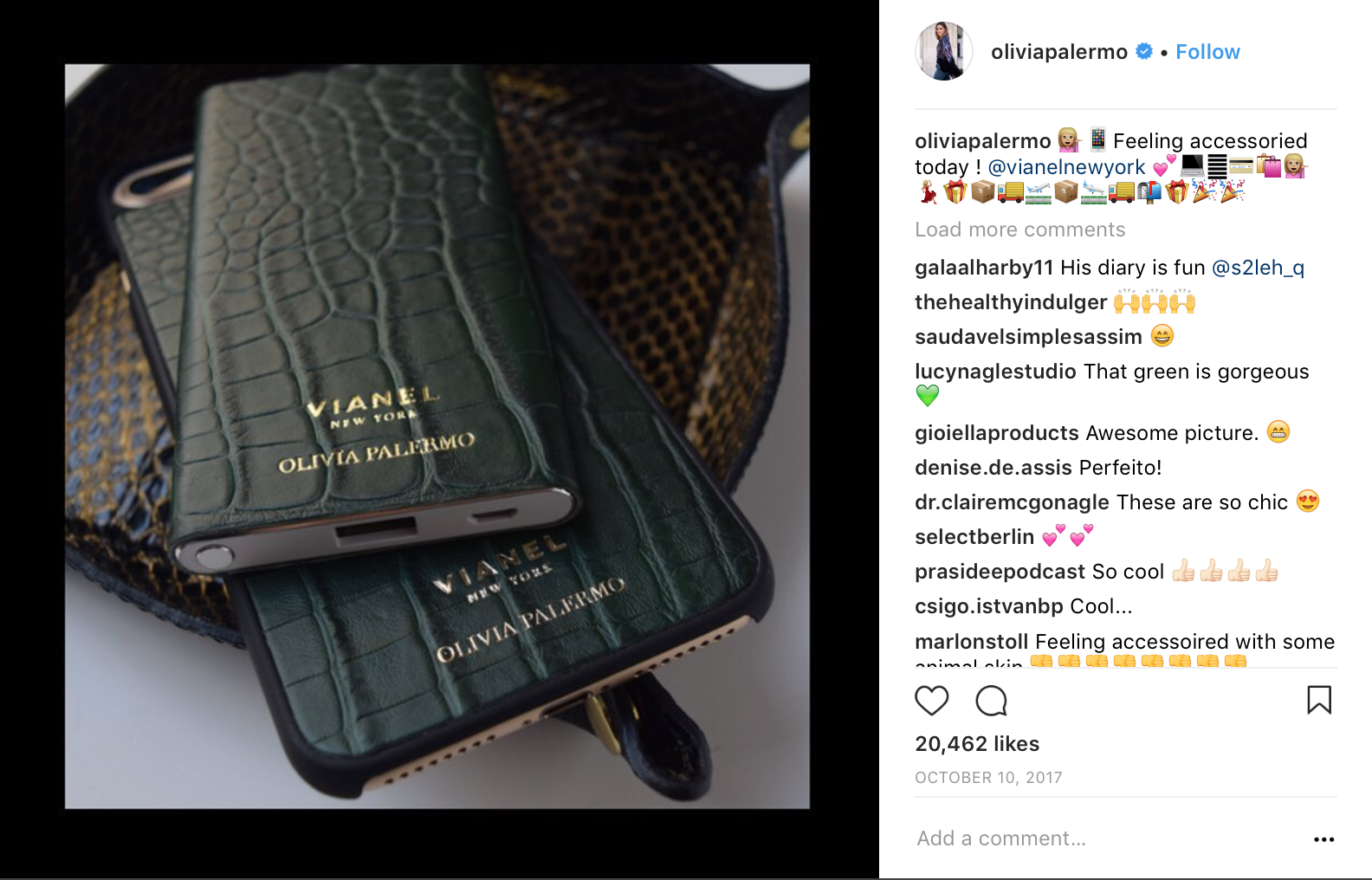 image: @oliviapalermo
image: @oliviapalermo
E. LEAST COMMENDABLE
These individuals occupy the lowest tier due to very low levels of properly disclosed sponsored posts and the highest rate of improperly disclosed sponsored posts. Their individual follower counts and the number posts they published during the time period were taken into account.
1. Camila Coelho (6.9M) – New: While Camila Coelho was not included in last year’s main ranking, she was included in the list of noted individuals that were largely failing to abide by the FTC’s guidelines. In the period of examination for 2017, her account exhibited a significant percentage of undisclosed and/or improperly disclosed posts.
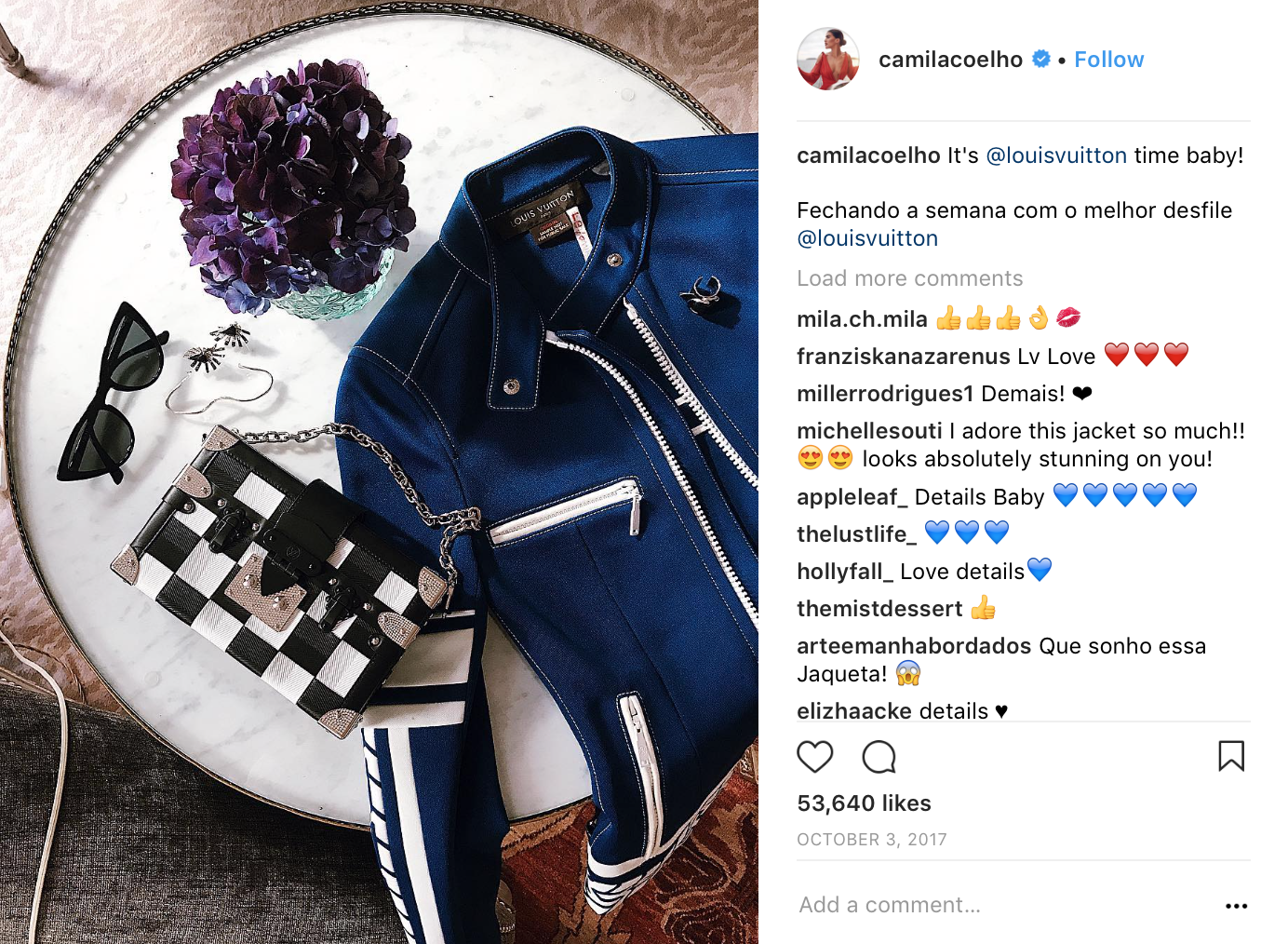 image: @camilacoelho
image: @camilacoelho
2. Kristina Bazan (2.3M) – One of the most poorly ranked of this year’s list, Kristina Bazan does not disclose her materials connections with brands at all. She ranked the second lowest (following Sarinana) in terms of the ratio of properly disclosed posts to improperly disclosed posts.
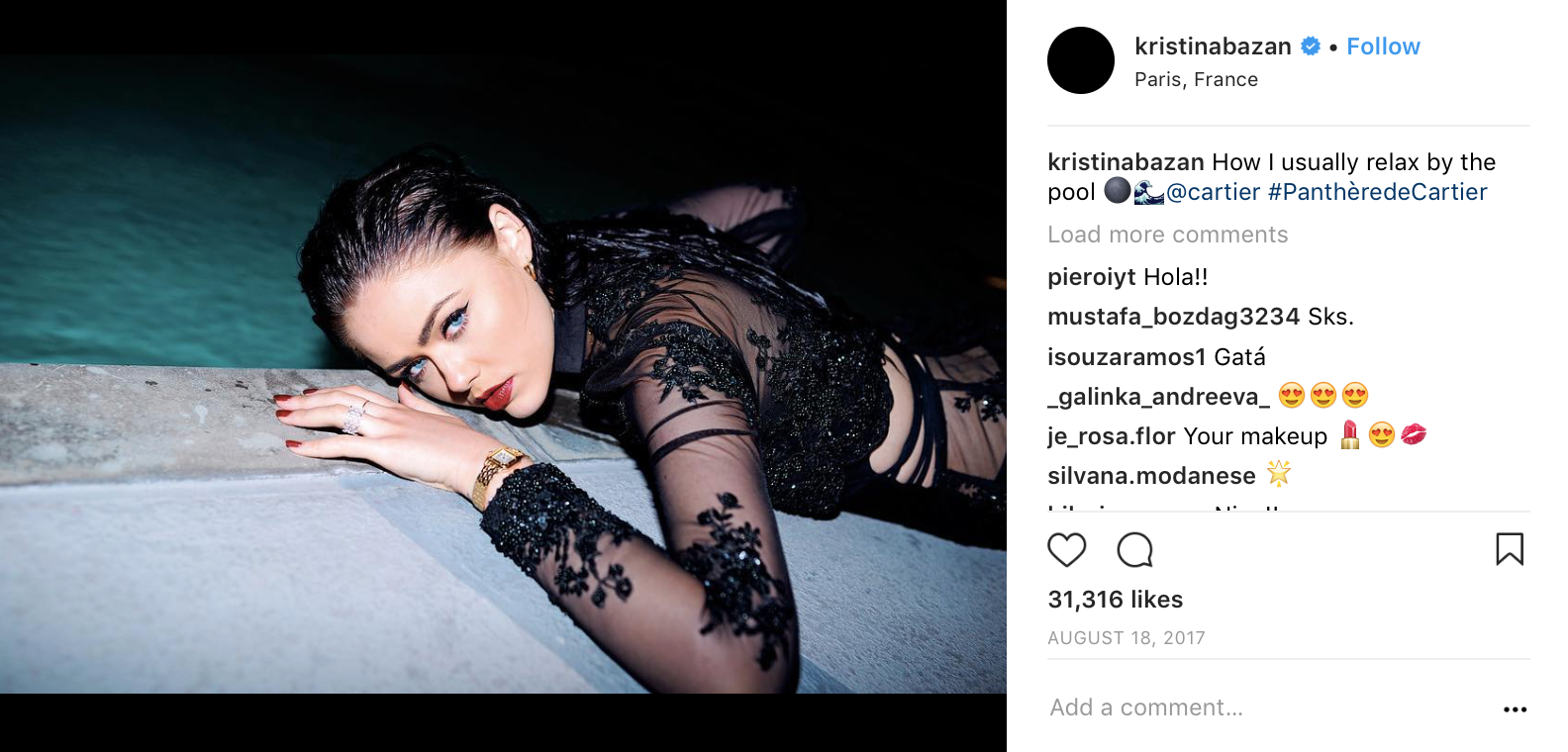 image: @kristinabazan
image: @kristinabazan
3. Julie Sariñana/Sincerely Jules (4.5M) – Julie Sariñana ranks so poorly due to the presence of an array of undisclosed (not improperly disclosed, but entirely undisclosed) posts, including some in connection with Cluse watches, Chasing Paper, Karl Lagerfeld, and Paige denim, among others.
Sariñana, who boasts a truly significant number of followers, nonetheless, managed to land at the top of the ‘Least Commendable’ placement in the category due to her very clear labeling of her own label, which is “Shop Sincerely Jules.” It is obvious to followers that she is affiliated with that brand, which is not necessarily always the case with influencers, particularly those that opt to call their collections something that does not include their own names and then fail to disclosure their affiliation. In this way, Sariñana is not misleading consumers.
II. BRANDS
Due to the number of brands whose practices fall outside of the FTC’s guidelines on proper disclosure, and the FTC’s continued emphasis that it is the duty of advertisers to ensure that influencers are properly disclosing paid-for (or otherwise compensated) posts, they have been categorized, as well. Unlike the bloggers/influencers list, the brands at issue are simply categorized according to the main hierarchy (Exemplary, Above Average, Average/Below Average, and Least Commendable), and the listing within each of the subcategories is random, and not ranked according to the most abiding.
A. EXEMPLARY/ ABOVE AVERAGE
These brands/companies ensured that bloggers/influencers properly disclosed paid-for or otherwise compensated posts nearly 100 percent – if not 100 percent – of the time.
American Express, Blue Apron, Gucci, Pantene, Sephora, and Target.
B. AVERAGE
These brands/companies rank highly in that the majority of their postings by bloggers/influencers were properly disclosed, save for some exceptions, which took the form of improperly placed (and thereby, obstructed) disclosures.
Amazon, Armani, Cartier, Express, H&M, Nike, and Tory Burch.
C. BELOW AVERAGE
These brands/companies are the ones that enabled bloggers/influencers to utilize potentially improper disclosure language such as, “ThanksCK” and merely #CKMinute for Calvin Klein, or #SWCollab for Stuart Weitzman. Moreover, it is within this group that many brands failed to ensure that influencers acting in a brand ambassador capacity adequately made this clear for their followers.
For instance, while Billabong noted on its website, in connection with an editorial starring Julie Sarinana that it has” been itching to bring Jules to the island of Oahu,” and while Sarinana thanked Billabong for the trip in one post of her, the brand failed to ensure that nearly 30 separate Instagram posts from Sarinana that featured Billabong were disclosed as resulting from a material relationship between the two parties.
Still yet, Billabong presented its own similar content on its website and Instagram account as though a formal endorsement relationship did not exist. In addition to referring to Sarinana merely as a “friend of the Billabong Womens fam,” as opposed to a compensated endorser, at least some of its Instagram posts, such as one that reads, “When @sincerelyjules is in our Aloha Babe dress,” are likely unclear to consumers. Given the frequency with which brands tend to repost imagery of influencers and celebrities wearing their garments (sometimes without a relationship at play), the sponsored nature of Billabong’s posts might be unclear to consumers.
Bauble Bar, Billabong, Estee Lauder, Grey Goose, Maserati, Max & Co., Michael Kors, Olay, Senreve, Sezane, Soludos, and Tiffany & Co.
D. LEAST COMMENDABLE
These brands/companies rank extremely poorly in terms of disclosures; they seem to either fail to educate influencers regarding the need to disclose and/or fail to monitor such postings. None of the posts on the aforementioned influencers’ pages that served to endorse Cluse’s watches were disclosed. It was extremely rare for any of the posts featuring Vueve Cliquot to include proper disclosures.
The same can be said for Revolve, which hosted upwards of 70 different sponsored influencer trips in 2017, with very – if any – including that such trips were, in fact, paid for by the retailer or that some posts, in particular, were contractually-mandated.
Finally, a few high fashion/luxury brands, such as Louis Vuitton, Christian Dior, Bulgari, and Valentino in particular, gifted a significant number of products to at least some of the aforementioned influencers, which went entirely undisclosed. Moreover, at least some of the influencers at issue, such as Aimee Song.
Bulgari, Chanel, Christian Dior, Cluse, Louis Vuitton, Nordstrom, Revolve, Valentino, and Vueve Cliquot.
III. FTC DISCLOSURE GUIDES
You may find detailed rules on how to abide by the FTC’s various guides here, and answers to what the FTC has deemed to be some of the most frequently asked questions in connection with its guidelines. For a simple ‘How To Guide,’ please visit The Fashion Law.
Given the FTC’s increased attention in this area, and its authority to take legal action, including disgorging all profits associated with improperly disclosed sponsored posts, it is essential that brands/companies and bloggers/influencers, alike, become familiar with and abide by the FTC’s mandates in advertising.
* This is the latest in a series of articles – entitled, The Business of Influence – dedicated to exploring the state of influencer marketing, which you will find this week on TFL.







